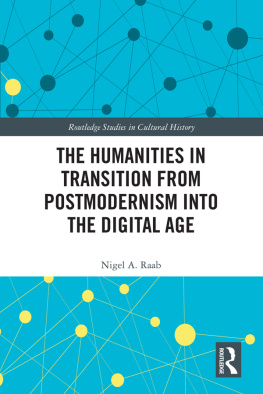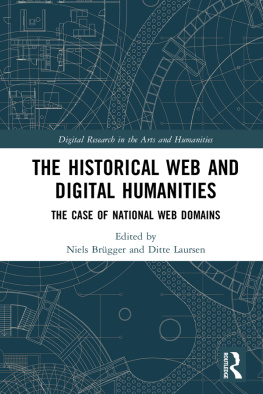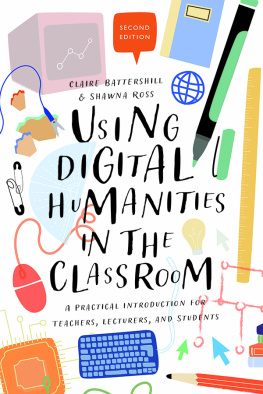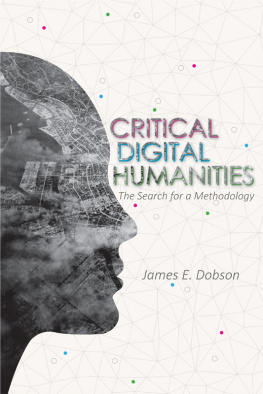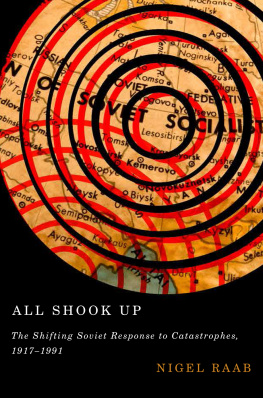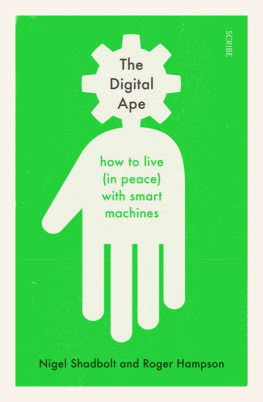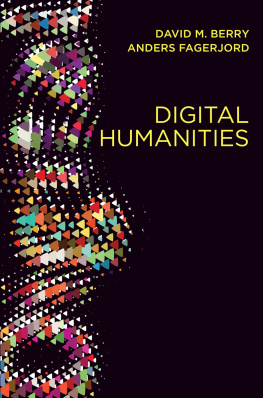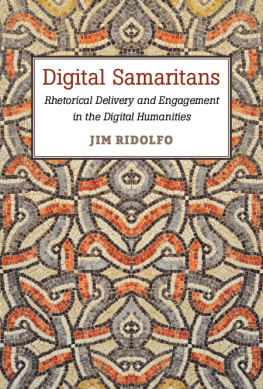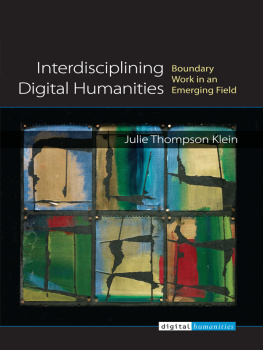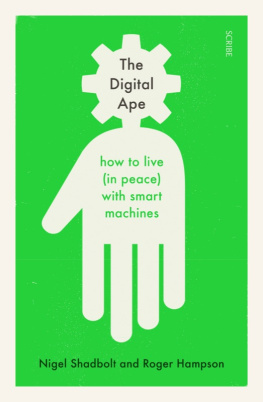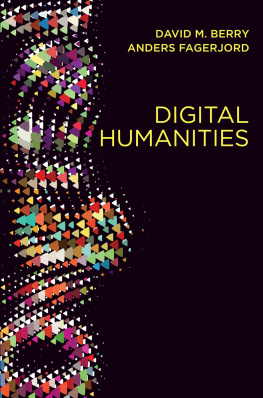The Humanities in Transition from Postmodernism into the Digital Age
The Humanities in Transition explores how the basic components of the digital age will have an impact on the most trusted theories of humanists. Over the past two generations, humanists have come to take basic postmodern theories for granted whether on language, knowledge or time. Yet Michel Foucault, Jacques Derrida and similar philosophers developed their ideas when the impact of this digital world could barely be imagined. The digital world, built on algorithms and massive amounts of data, operates on radically different principles.
This volume analyzes these differences, demonstrating where an aging postmodernism cannot keep pace with todays technologies. The book first introduces the major influence postmodernism had on global thought before turning to algorithms, digital space, digital time, data visuals and the concept to digital forgeries. By taking a closer look at these themes, it establishes a platform to create more robust humanist theories for the third millennium. This book will appeal to graduate students and established scholars in the Digital Humanities who are looking for diverse and energetic theoretical approaches that can truly come to terms with the digital world.
Nigel A. Raab is professor of Russian history at Loyola Marymount University, Los Angeles, California.
Routledge Studies in Cultural History
Cultural Organizations, Networks and Mediators in Contemporary
Ibero-America
Edited by Diana Roig-Sanz and Jaume Subirana
Soldiers and Their Horses
Sense, Sentimentality and the Soldier-Horse Relationship in The Great War
Jane Flynn
The Magic Lantern at Work
Witnessing, Persuading, Experiencing and Connecting
Edited by Martyn Jolly and Elisa deCourcy
Women Photographers of the Pacific World, 18571930
Anne Maxwell
How Books, Reading and Subscription Libraries Defined Colonial Clubland in the British Empire
Sterling Joseph Coleman, Jr.
Russias French Connection
A History of the Lasting French Imprint on Russian Culture
Adam Coker
Transatlantic Encounters in History of Education
Translations and Trajectories from a German-American Perspective
Edited by Fanny Isensee, Andreas Oberdorf, and Daniel Tpper
The Humanities in Transition from Postmodernism into the Digital Age
Nigel A. Raab
For more information about this series, please visit: www.routledge.com/Routledge-Studies-in-Cultural-History/book-series/SE0367
First published 2020
by Routledge
52 Vanderbilt Avenue, New York, NY 10017
and by Routledge
2 Park Square, Milton Park, Abingdon, Oxon, OX14 4RN
Routledge is an imprint of the Taylor & Francis Group, an informa business
2020 Taylor & Francis
The right of Nigel A. Raab to be identified as author of this work has been asserted in accordance with sections 77 and 78 of the Copyright, Designs and Patents Act 1988.
All rights reserved. No part of this book may be reprinted or reproduced or utilised in any form or by any electronic, mechanical, or other means, now known or hereafter invented, including photocopying and recording, or in any information storage or retrieval system, without permission in writing from the publishers.
Trademark notice: Product or corporate names may be trademarks or registered trademarks, and are used only for identification and explanation without intent to infringe.
Library of Congress Cataloging-in-Publication Data
Names: Raab, Nigel A., 1968 author.
Title: The humanities in transition from postmodernism into the
digital age / Nigel A. Raab.
Description: New York : Routledge, 2020. | Series: Routledge studies
in cultural history; vol 89 | Includes bibliographical references and
index.
Identifiers: LCCN 2020015959 (print) | LCCN 2020015960 (ebook) |
ISBN 9780367896799 (hardback) | ISBN 9781003020493 (ebook) |
ISBN 9781000091465 (adobe pdf) | ISBN 9781000091472 (mobi) |
ISBN 9781000091489 (epub)
Subjects: LCSH: Digital humanities. | Postmodernism. | Culture
Philosophy.
Classification: LCC AZ105 .R28 2020 (print) | LCC AZ105 (ebook) |
DDC 001.30285dc23
LC record available at https://lccn.loc.gov/2020015959
LC ebook record available at https://lccn.loc.gov/2020015960
ISBN: 978-0-367-89679-9 (hbk)
ISBN: 978-1-003-02049-3 (ebk)
Typeset in Sabon
by Apex CoVantage, LLC
To the city of Los Angeles, my city of inspiration
The thanks for every book should really be longer than the book itself, but I will keep it short. A big thank you to Max Novick at the press for his guidance. Once again, I have to thank Alice Raab, who in another era would have been a master editor at a major publishing house. She turns clotted prose into something readable and saves me from all my bad intellectual habits. I also must thank the anonymous readers who did much of the same by forcing me to clean up shaky ideas and drop anchors where I started to drift. My dad, Tony, has always encouraged me to seek new thoughts and pursue my dreams. Carolyn Peter, my wife, is the sounding board for so many crazy schemes. She is the warm soul whose sensitivity fills every room of our house, and without her I would probably be little more than moss on a log.
Venice Beach, 2020
Introduction
Well over a generation ago, a movement arrived on the academic scene and spurred a series of energetic debates that engaged the brightest minds on both sides. In the aftermath of World War II, a younger generation was ready for a fundamental reassessment of the Western project. If the Nazis were a reflection of a Western value system born in the Enlightenment of the eighteenth century, then the system was corrupt at its core. In the words of philosophers and literati, the core was formed by a rational worldview that could be as stifling and repressive as Enlightenment thinkers had believed it to be liberating. Rationality was the heart of the death star and had to be destroyed.
Combatant metaphors serve well because any attempt to undermine rationality was quickly challenged by traditional scholars who were convinced that the Western tradition with its emphasis on objectivity and rationality had improved the lot of human beings on planet earth. These scholars mocked the idea that knowledge was relative, that the outcome of science was the result of mob rule in the laboratory, and that human rights were a cultural construct. This stubbornness drew battle lines that were fought on many fronts, and these serious battles continued for decades.
As this division spread into curricula in colleges around the world, the Turning in the opposite direction, postmodernists saw their mission as the opening of the American mind and continued to fight vigorously against scholars such as Bloom.
Back then, postmodernism was in its early adulthood and acted with an energy appropriate to its age. If we can pin its adolescence to the seminal works by Jacques Derrida and Michel Foucault in the 1960s, by the 1980s it was a mature and widespread force that sought its own place in the sun. This was a well-deserved place, and with time, postmodernists no longer had to worry about being silenced. In the 1960s, to suggest that science was socially constructed was radical and ran up against massive criticism from outside the humanities. Nowadays, to say otherwise is to invite massive criticism from within the humanities. Postmodern ideas slowly entered the mainstreamchecking a box marked gender rather than one marked sex comes to mindand their vision was accepted, if reluctantly and with certain reservations, by the rest of the academy. Even if this was by no means a clear victory, shared space had been achieved.

